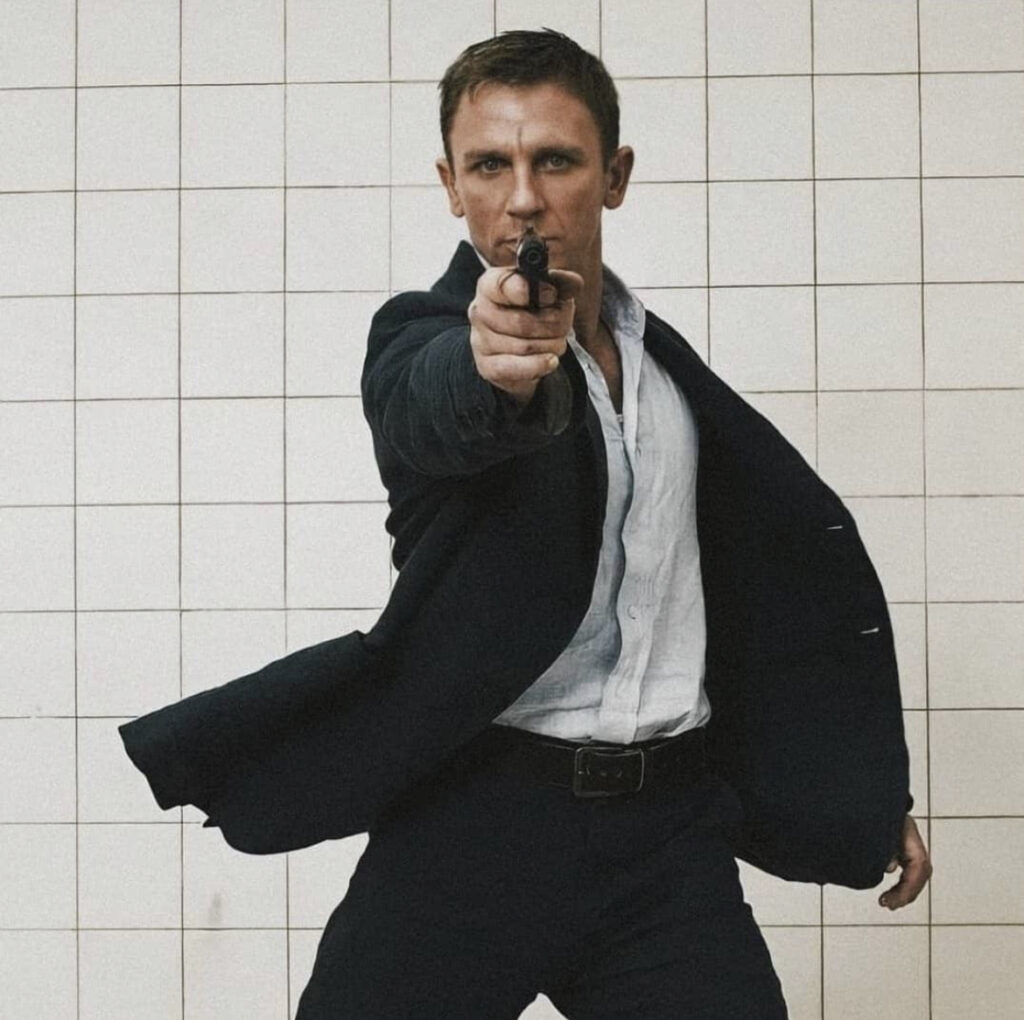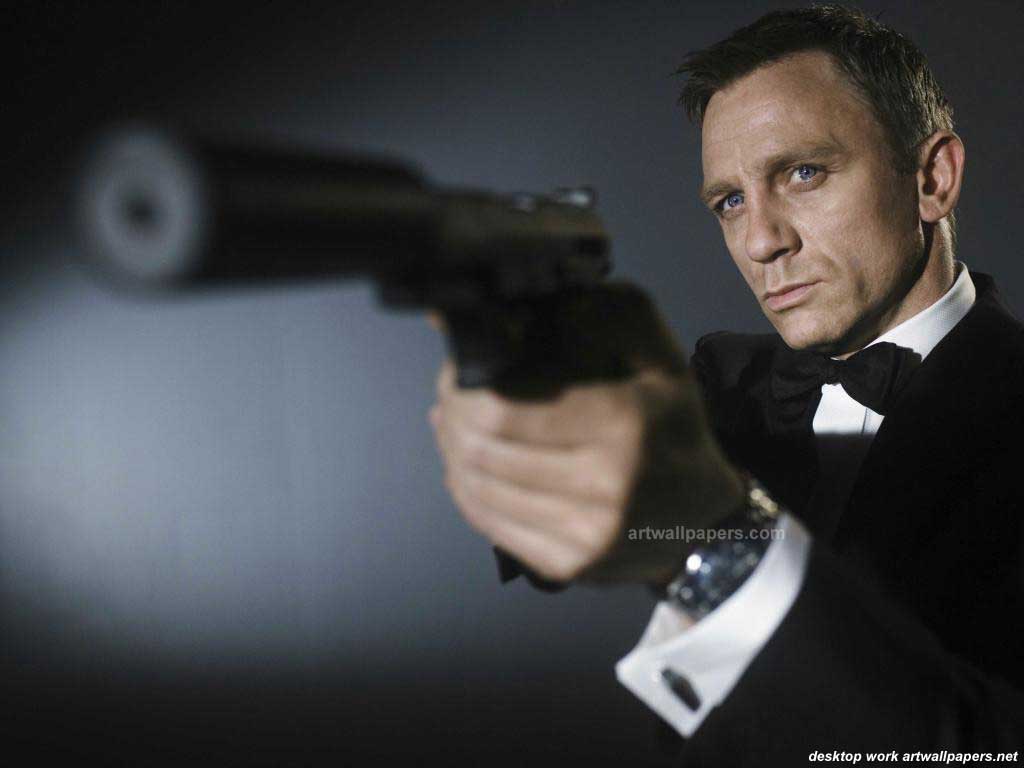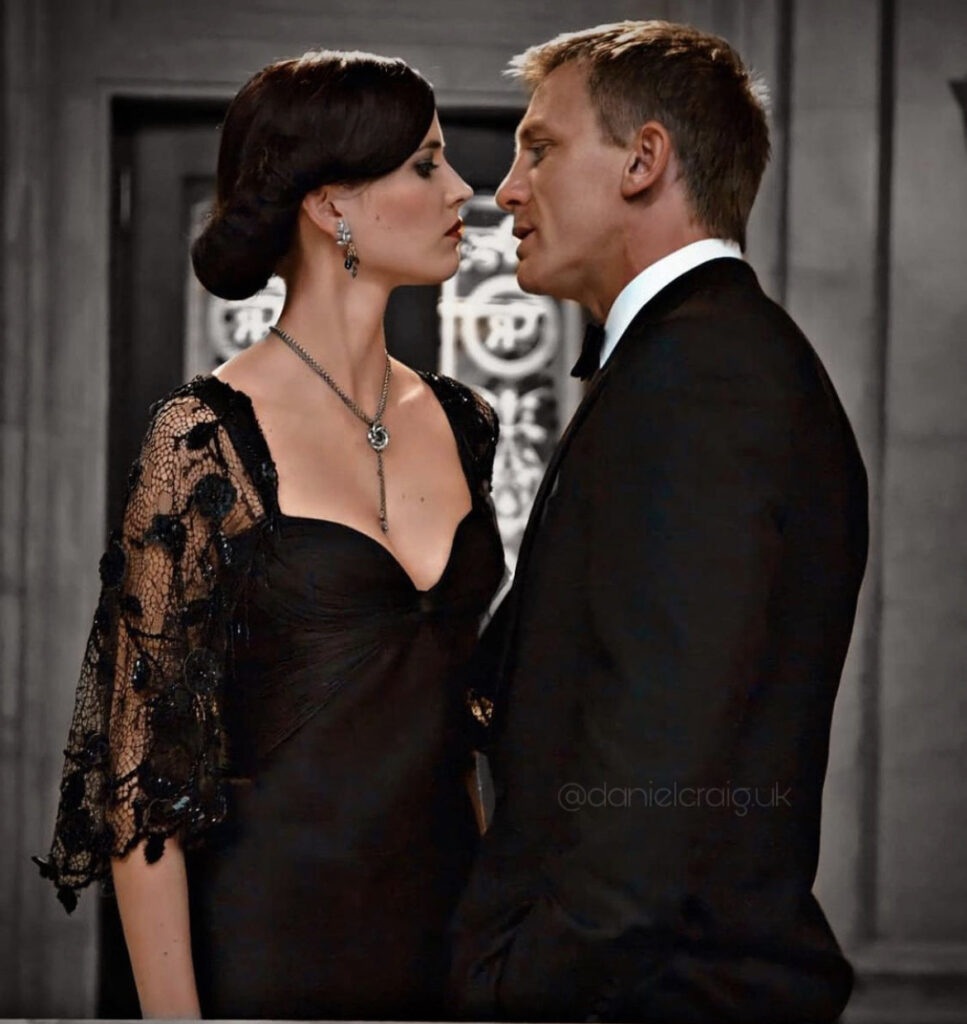Casino Royale (2006)

DIRECTOR: Martin Campbell
CAST: Daniel Craig, Eva Green, Mads Mikkelsen, Judi Dench, Jeffrey Wright, Giancarlo Giannini, Caterina Murino
REVIEW:
With Casino Royale, Martin Campbell has done for 007 what Christopher Nolan did for Batman with Batman Begins the year before: reboot a floundering film franchise back to the basics and start afresh, as if none of the previous films happened. This is Bond stripped down to the nitty gritty. There are no gadgets, no Q, no Moneypenny, restrained sexcapades, and a Bond who’s the most serious he’s been in decades. The iconic line of “Bond, James Bond” isn’t uttered until the closing scene, and the James Bond theme is only heard in brief, subdued snippets until finally playing in full over the ending credits. Even the opening sequences’ conspicuous lack of the expected naked women indicates this “new” series’ direction. This Bond still enjoys attractive women and Aston Martins, he still drinks Martinis, and he still occasionally slips into a tux in glamorous international locales, but the mission holds most of his steely-eyed attention. Those who grew up on the campy tongue-in-cheek charm, nifty gadgets, and wildly over-the-top action of Roger Moore and Pierce Brosnan’s outings may find this Bond disappointing, but others welcomed it with enthusiasm as the first since Sean Connery, and maybe the first ever, to truly portray the cold-blooded professional killer from Ian Fleming’s original novel series (it’s based on Fleming’s novel of the same name, and while other Bond films have used the names of Fleming novels while jettisoning most of the plots, this one follows its namesake fairly closely), before that perception of 007 was overtaken by the ultra-suave super-spy action hero and ladies’ man.
The plotline, at least for the first two-thirds, is in fairly standard 007 territory. James Bond (Daniel Craig) has finally completed the two kills required for promotion to elite 00 status, though his frosty boss M (Judi Dench), is skeptical of his readiness. The newly-minted 007’s first major mission takes him first to the Bahamas, then Miami, and finally to a high-stakes poker game in Montenegro for a contest with Le Chiffre (Mads Mikkelsen), who finances international terrorism but suffered heavy losses after Bond thwarted one of his schemes and is now trying to win the money back at the poker table to appease his angry clients. Accompanying Bond is Vesper Lynd (Eva Green), a Treasury official funding him at the table, along with local contact Mathis (Giancarlo Giannini) and undercover CIA agent Felix Leiter (Jeffrey Wright). Danger mounts as the stakes climb higher both at and away from the poker table, Le Chiffre and his clients try to remove 007 from the equation, and most surprisingly…Bond falls in love.
 Casino Royale is fairly subdued by Bond’s sometimes wildly over-the-top standards, but it supplies a number of memorable action sequences, including an early foot chase and a later chase at a Miami airport that throw in enough nifty stuntwork and variety to be more engaging than just generic chase scenes. Later there’s a fast-and-furious fight with a machete-wielding henchman on a stairway that’d be right at home in a Jason Bourne film, and a climactic watery catastrophe involving Bond and baddies fighting inside a Venice building that’s collapsing into the canal. Director Martin Campbell, no stranger to action (he also directed Brosnan’s 007 debut, 1995’s Goldeneye, along with The Mask of Zorro and its sequel The Legend of Zorro) handles the action sequences competently, avoiding quick-cuts or confusing editing. The action in Casino Royale is clear and coherent. The film’s structure is somewhat unconventional, and might surprise viewers. The first two-thirds are the most like a conventional Bond film, albeit taken more seriously and with more restraint than some. The tone is set in the opening scene, filmed in stark black-and-white, in which Bond engages in a brutal, down and dirty hand-to-hand fight to the death in a restroom, and the rest of the movie follows suit. The newly-promoted 007 isn’t an invincible Superman, nor does he care about getting roughed up. This Bond likes Martinis, Aston Martins, and women, but he’s got no qualms about getting down and dirty to a level it’s hard to imagine Brosnan or especially Moore doing, and late in the movie he’s also subjected to some of the most vicious treatment Bond’s ever received. For the opening third, Bond globe-trots, fights baddies, and has an inconsequential fling with an obligatory beautiful and exotic woman (Caterina Murino). The pace slows down at the poker table that takes up a lion’s share of the midsection, though this is broken up by the stairway fight and a poisoning that keep us from getting too restless. Things seem to wrap up two-thirds of the way in, and we proceed with a idyllic seeming extended epilogue of Bond and Vesper enjoying a romantic getaway, but the suspicious amount of time remaining and the tragedy that befell Bond the last time he fell in love (all the way back in 1969’s On Her Majesty’s Secret Service) gives us the feeling we haven’t seen everything yet.
Casino Royale is fairly subdued by Bond’s sometimes wildly over-the-top standards, but it supplies a number of memorable action sequences, including an early foot chase and a later chase at a Miami airport that throw in enough nifty stuntwork and variety to be more engaging than just generic chase scenes. Later there’s a fast-and-furious fight with a machete-wielding henchman on a stairway that’d be right at home in a Jason Bourne film, and a climactic watery catastrophe involving Bond and baddies fighting inside a Venice building that’s collapsing into the canal. Director Martin Campbell, no stranger to action (he also directed Brosnan’s 007 debut, 1995’s Goldeneye, along with The Mask of Zorro and its sequel The Legend of Zorro) handles the action sequences competently, avoiding quick-cuts or confusing editing. The action in Casino Royale is clear and coherent. The film’s structure is somewhat unconventional, and might surprise viewers. The first two-thirds are the most like a conventional Bond film, albeit taken more seriously and with more restraint than some. The tone is set in the opening scene, filmed in stark black-and-white, in which Bond engages in a brutal, down and dirty hand-to-hand fight to the death in a restroom, and the rest of the movie follows suit. The newly-promoted 007 isn’t an invincible Superman, nor does he care about getting roughed up. This Bond likes Martinis, Aston Martins, and women, but he’s got no qualms about getting down and dirty to a level it’s hard to imagine Brosnan or especially Moore doing, and late in the movie he’s also subjected to some of the most vicious treatment Bond’s ever received. For the opening third, Bond globe-trots, fights baddies, and has an inconsequential fling with an obligatory beautiful and exotic woman (Caterina Murino). The pace slows down at the poker table that takes up a lion’s share of the midsection, though this is broken up by the stairway fight and a poisoning that keep us from getting too restless. Things seem to wrap up two-thirds of the way in, and we proceed with a idyllic seeming extended epilogue of Bond and Vesper enjoying a romantic getaway, but the suspicious amount of time remaining and the tragedy that befell Bond the last time he fell in love (all the way back in 1969’s On Her Majesty’s Secret Service) gives us the feeling we haven’t seen everything yet.
Blond, strikingly blue-eyed, craggy-faced Daniel Craig, whose unconventional looks made him a controversial choice when his casting was announced, especially coming on the heels of the suave Pierce Brosnan, dives into his debut with confidence and aplomb, proving that attitude trumps appearances. Craig strolls onscreen with complete self-assurance that he is 007, and his conviction makes us quickly accept him. Craig is not conventionally handsome, but he’s notably buff, looks good in a tuxedo, has the right dry sarcasm in his delivery of Bond’s spare quips, and is believably tough in hand-to-hand fight scenes. Unconventional as he may seem at first glance, he establishes himself as easily among the better Bonds, not least of which because he’s a Bond who seems like he could kick pretty much any other Bond’s ass. He’s devoid of the fatuousness of Roger Moore without the stiffness of Timothy Dalton. He nails the cool, emotionally detached killer from Fleming’s novels, while also conveying a tightly-guarded vulnerability. Craig’s out-of-the-box casting is easily one of Casino Royale‘s strongest elements. In fact, it might be the best thing about the movie.
The supporting players are well-chosen. Eva Green has two qualities that set her apart from and above most disposable Bond girls; she doesn’t easily fall into bed with 007 (in fact, it takes most of the movie), and she can hold her own trading barbed repartee. She’s a legitimate character, not a sex object, showing both tough and vulnerable sides. We can buy her as someone who possesses enough brains and personality along with her looks to beguile Bond more than just another disposable side distraction, and she and Craig have chemistry. Danish actor Mads Mikkelsen brings a smooth menace to Le Chiffre, although a large portion of his screentime involves glowering at Bond across a poker table. Le Chiffre is low-key by Bond villain standards (he’s not a megalomaniac, just greedy and ruthless) and SPOILER WARNING his demise comes as a surprise, both by not being delivered by Bond himself, and by coming before the climax. Jeffrey Wright and Giancarlo Giannini are wasted in minor roles as Bond’s allies in Montenegro. Wright’s in particular is the kind of part cast with a talented and recognizable actor that seems so superfluous that we wait for some juicy revelation which unfortunately never comes. The only series veteran to return here is Judi Dench as Bond’s often exasperated boss M. While her presence here makes dubious sense—if everything else, including Bond himself, is being rebooted, why is she still here?–it’s hard to picture anyone else delivering her acerbic one-liners, and she quickly establishes the same back-and-forth headbutting chemistry with Craig that she shared for multiple films with Pierce Brosnan. Apparently the filmmakers decided Dench was too good to be replaced, and it’s hard to fault them.
Casino Royale is the most all-around solid Bond installment to come along in quite some time, and thanks in large part to Craig’s effectively unconventional casting, succeeds at breathing fresh life into a stale franchise and making it relevant for modern audiences seeking something a little more gritty and down-to-earth and less cartoonish. Notably, it’s not a new behind-the-scenes team that’s pulled this reboot off. Longtime producers Michael G. Wilson and Barbara Broccoli are still onboard. Screenwriters Neal Purvis and Robert Wade were also involved in Brosnan’s last two outings. Martin Campbell also directed Brosnan’s debut. Composer David Arnold has been composing Bond scores since the ’90s. But they’ve successfully shifted the tone of the series sufficiently that everything feels fresh and new. James Bond, who once seemed increasingly like an outdated misogynistic relic, now feels like a relevant 21st century action hero (or maybe anti-hero). Here’s hoping that continues.
***
